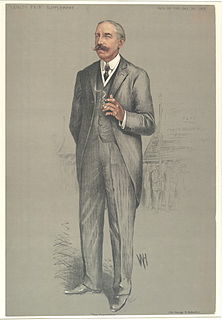Related Research Articles

Admiral of the Fleet Sir John Julian Robertson Oswald was a senior Royal Navy officer. After training as a gunnery specialist, Oswald commanded a frigate and then a destroyer before achieving higher command in the navy. He served as First Sea Lord and Chief of Naval Staff in the early 1990s. In that capacity he advised the British Government on the reduction in the size of the fleet under the Options for Change restructuring programme and on the deployment of Naval Support for the Gulf War in 1991: he also made the decision that members of the Women's Royal Naval Service should be allowed to serve in Royal Navy ships.

Sir James Dundas Harford was a British diplomat who served as Governor of Saint Helena from 1954 to 1958.
Lieutenant-Colonel John Kyme Cordeaux, was a Conservative Party politician in the United Kingdom.
Rowland Ponsonby Blennerhassett KC, JP was an Irish politician.

Alexander Francis Kirkpatrick was Regius Professor of Hebrew at Cambridge University (1882–1903) and the third Master of Selwyn College, Cambridge (1898–1907).
Rear Admiral Ion Beauchamp Butler Tower, was a British naval officer.

John Smyth (1748–1811) was a British politician who sat in the House of Commons from 1783 to 1807.
Admiral Sir William Wellclose Davis was a Royal Navy officer who went on to be Vice Chief of the Naval Staff.

Admiral Sir Alan Kenneth Scott-Moncrieff, was a Royal Navy officer who served as Commander-in-Chief, Far East Fleet from 1955 to 1957.
Vice Admiral Sir Peveril Barton Reiby Wallop William-Powlett, was a Royal Navy officer who served as Commander-in-Chief, South Atlantic Station from 1952 to 1954.
Rear Admiral John Gervaise Beresford Cooke CB DSC was a Royal Navy officer who became Naval Secretary.

George Ranken Askwith, 1st Baron Askwith, KCB, KC, known as Sir George Askwith between 1911 and 1919, was an English lawyer, civil servant and industrial arbitrator.
Sir George Henry Morse was an English brewer, administrator and mountaineer. He was Lord Mayor of Norwich and later President of the Alpine Club.
Garret Moore, 1st Viscount Moore PC (I) was an Anglo-Irish politician and peer.
Gerard Mackworth Young CIE (1884–1965) was director of the British School at Athens from 1936 to 1946.
Peter Sacheverell Wilmot-Sitwell was a British merchant banker and stockbroker. He is credited with inventing the "dawn raid" which enabled companies to build up a stake in a takeover target before the target had the chance to react. He was described by the Financial Times as a "gentleman banker", and one of the last of "an almost extinct breed" from the pre-Big Bang era.
Francis Lynch Wellington Stapleton-Cotton, 4th Viscount Combermere DL
Sir Charles Stewart Addis KCMG was a Scottish banker.
Arthur Henry Johnstone-Douglas JP DL was a Scottish soldier and politician.

Dominic Robert Andrew Johnson, Baron Johnson of Lainston is a British financier, hedge fund manager and politician, the co-founder and chief executive officer (CEO) of Somerset Capital Management. In October 2022, Johnson was appointed as a minister in the Cabinet Office and the Department for International Trade. Johnson has given more than £250,000 to the Conservative Party, and was its vice-chairman from 2016 to 2019.
References
- 1 2 Peter Wilmot-Sitwell obituary. The Times, 28 June 2018. Retrieved 17 July 2018. (subscription required)
- ↑ Debrett's Peerage, Baronetage, Knightage and Companionage, Debrett's Peerage Ltd, 1985, p. 1114
- ↑ Burke's Landed Gentry, 18th edition, vol. 1, ed. Peter Townend, Burke's Peerage Ltd, 1965, pp. 630-1
- ↑ Robert Bradshaw Wilmot-Sitwell England Deaths and Burials, 1538-1991. Family Search. Retrieved 14 August 2018. (subscription required)